In this course, we have discussed the essential items you need to prepare. Today, let’s explore how to prepare yourself mentally for the weight loss journey. It’s essential to find the inner motivation that will keep you moving forward.
Section 1: Find Your Weight Loss Motivation
Have you ever wondered why so many people want to lose weight, and experts emphasize the negative impact of obesity on health? Is it merely for health concerns? But in nature, animals with more fat have a stronger survival advantage and higher status. So, why are so many people eager to lose weight and get in shape? Could it involve complex psychological motivations?
Your task is to identify your psychological motivation, the deep reason behind your desire to lose weight. It will be the foundation and long-term support for your transformation. Let’s begin with a fun little exercise. From a list of 63 words, choose the ten that resonate with you the most. Then, select the three most important ones from those ten and create a sentence that represents your weight loss motivation.
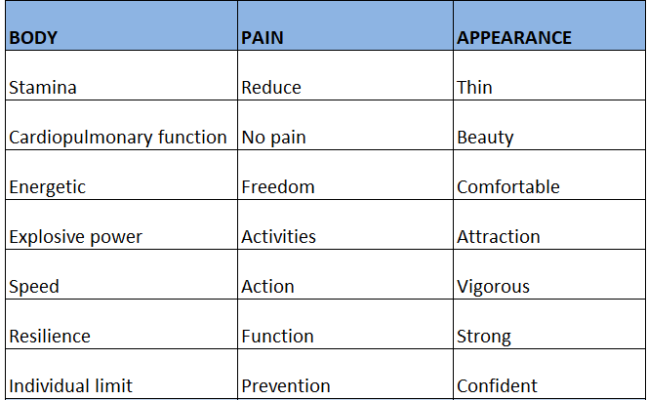
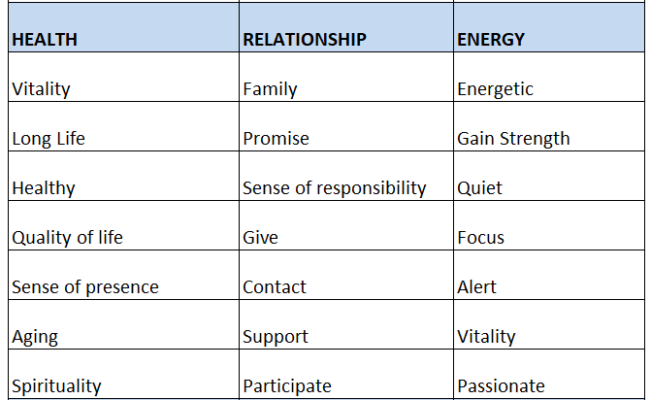
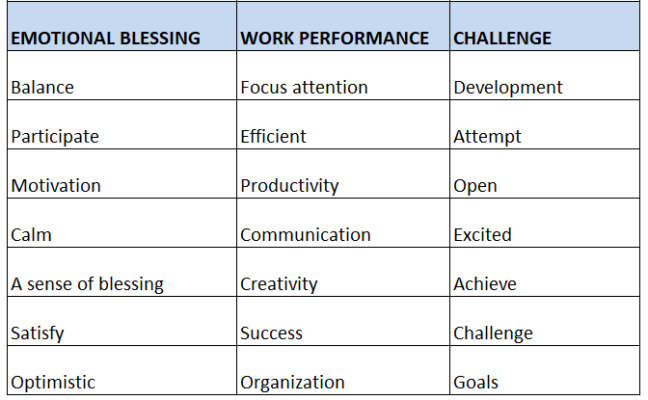
For example, let’s take two participants. Jack’s ten selected words are strength, freedom, attractive, organization, focus, satisfaction, and creativity. From these, his top three are attractive, organization and focus. His sentence is, “I want to be more attractive, focused, and lead others in my organization.”
So this sentence indicates Jack’s weight loss motivation
Next, Mary’s ten selected words are beauty, health, vitality, success, and satisfaction. Her top three are attractiveness, vitality, and satisfaction. Her sentence is, “I hope to be vibrant, attractive, and content.” So this sentence indicates Mary’s weight loss motivation.
Now it’s your turn to go through the same process and let this sentence guide you throughout the course. The results might surprise you!
Section 2: Overcoming Self-Criticism
My initial belief, like many others, was that overweight individuals become obese due to excessive food intake. However, after becoming a coach and having numerous opportunities to interact with overweight clients, I realized that their obesity is not primarily caused by overeating, but rather by a lack of nutritional balance.
Overweight individuals often have dietary habits that are high in fat, salt, and sugar. However, their diet is severely lacking in protein and essential vitamins. Additionally, they tend to consume inadequate amounts of water. This dietary pattern is the most common underlying cause of obesity.
Many individuals struggling with weight loss face a common problem—self-criticism and negative self-perception. They punish themselves for small indulgences, creating a vicious cycle of emotional eating. This is often linked to perfectionism, an unrealistic vision of an ideal self. However, perfection doesn’t necessarily mean looking flawless but rather, being better than before.
Accept that you are not perfect, and occasional indulgences are natural. When you recognize your emotions driving you to eat, address the underlying issue. Look for the source of your emotional distress and tackle it head-on. This shift in focus will prevent you from falling into the binge-eating trap.
Section 3: Say No to Emotional Eating – Shift Your Focus When you feel the urge to eat, ask yourself whether it’s genuine hunger or an emotional response. If it’s the latter, take the opportunity to identify the emotion causing it. Address the root cause and find alternative ways to cope with your emotions, such as reading, listening to music, or exercising. This will redirect your attention away from food, leading to positive changes in both your weight loss journey and personal growth.
Section 4: Handling Weight Fluctuations –
Stay Composed Weight fluctuations during your journey are normal and can be caused by various factors like eating habits, hormonal changes, or water retention. Don’t panic; instead, focus on long-term progress. We recommend weighing yourself in the morning after using the restroom. Use the same scale and, if possible, weigh yourself without clothes. Remember, your weight will fluctuate, but trust in yourself and your efforts. Embrace your imperfections, and you’ll become even more attractive and confident.
If you were previously following a weight loss method of completely avoiding food or severely restricting your intake and you feel like you have hit a plateau, joining our program and returning to a regular three-meals-a-day schedule will likely cause a temporary weight increase. When this happens, there’s no need to worry too much because it’s a natural response to your body previously being in a state of nutritional deprivation. Once you adopt the balanced and nutritious diet we recommend, your weight will naturally start to decrease within a day or two.
Conclusion: As with driving, becoming a skilled weight loss practitioner requires patience, resilience, and self-compassion. Buckle up, put your foot on the gas pedal, and drive with determination and understanding. Trust in the process, follow the rules, and enjoy a well-balanced diet. Remember, you’re not alone on this journey. We’re here to guide you and help you become the best version of yourself. Let’s begin this transformational adventure together!
在本课程中,我们已经讨论了你需要准备的必备物品。今天,让我们一起探索如何在减重旅程中做好心理准备。找到内在的动力,它将推动你不断前进。
第一部分:找到你的减重动力
你是否曾经想过为什么这么多人想要减重,专家强调肥胖对健康的负面影响?仅仅是为了健康吗?在自然界中,体脂较多的动物具有更强的生存优势和更高的地位。那么,为什么那么多人渴望减重并保持身材?是否涉及复杂的心理动机?
你的任务是找到你的心理动力,即你想减重背后的深层原因。它将是你变身和长期支持的基础。让我们从一个有趣的小练习开始。从一个包含63个词的列表中,选择与你最相关的十个词。然后从这十个词中选择三个最重要的词,并创建一个代表你减重动力的句子。

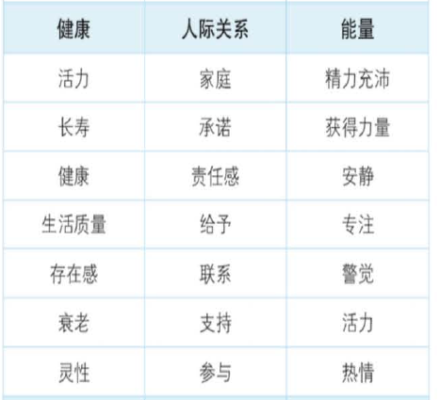
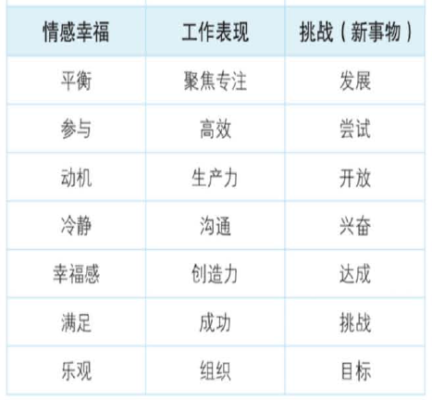
例如,我们来看两个参与者。杰克选中的十个词是力量、自由、吸引人、组织、专注、满足和创造力。从中选择的三个最重要的词是吸引人、组织和专注。他的句子是:“我想变得更有吸引力、专注,并在我的组织中引领他人。”
所以,这个句子表明了杰克的减重动力。
接下来,玛丽选中的十个词是美丽、健康、活力、成功和满足感。她选择的三个最重要的词是吸引力、活力和满足感。她的句子是:“我希望自己充满活力、有吸引力,并感到满足。” 所以这个句子表明了玛丽的减重动力。
现在轮到你了,按照同样的过程,让这个句子指引你在整个课程中前进。结果可能会让你惊讶!
第二部分:克服自我批评
我最初的观念,与许多人一样,认为超重的人是由于摄入过多食物而导致肥胖。然而,在成为教练并与众多超重客户交流的机会后,我意识到他们的肥胖主要不是由于过量饮食,而是缺乏营养平衡。
超重的人往往有高脂肪、高盐和高糖的饮食习惯。然而,他们的饮食严重缺乏蛋白质和必要的维生素,同时他们喝水量也很少。这种饮食模式是导致肥胖的最常见潜在原因。
许多减重困扰的人面临一个共同问题,就是自我批评和消极的自我认知。他们因为小小的放纵而自责,从而形成情绪性进食的恶性循环。这通常与完美主义有关,对完美自我的不切实际设想。然而,完美并不一定意味着看起来完美无瑕,而是比过去更好。
接受自己并允许偶尔的放纵是自然的。当你意识到情绪驱使你吃东西时,找到潜在问题的根源。找到情绪困扰的来源,并勇敢面对。这种关注转移将防止你陷入暴饮暴食的陷阱。
第三部分:拒绝情绪性进食——转移注意力
当你感到食欲时,问问自己是真正的饥饿还是情绪的反应。如果是后者,就抓住机会找出引发这种情绪的原因。解决情绪根源,并寻找其他应对情绪的方式,比如阅读、听音乐或锻炼。这将将你的注意力从食物上转移,带来减重旅程和个人成长方面的积极变化。
第四部分:处理体重波动——保持冷静
在你的减重旅程中,体重波动是正常的,可能是由于饮食习惯、激素变化或水潴留等各种因素导致的。不要惊慌,而是专注于长期进步。我们建议在早上上厕所后称体重。使用同一台秤,并尽可能不穿衣服。记住,体重会波动,但要相信自己和自己的努力。接受自己的不完美,你会变得更有吸引力和自信。
如果你之前采用的减重方法是完全避免食物或严格限制摄入量,而且感觉自己达到了瓶颈,加入我们的计划,恢复每天三餐的规律作息可能会导致暂时的体重增加。当发生这种情况时,不用太担心,因为这是你之前处于营养匮乏状态的自然反应。一旦你采纳我们推荐的均衡和营养丰富的饮食,你的体重自然会在一两天内开始下降。
结论:就像驾车一样,成为一名熟练的减重实践者需要耐心、坚韧和自我同情。系好安全带,踩下油门,坚定且理解地驾驶。相信这个过程,遵循规则,享受均衡的饮食。记住,在这个旅程中你并不孤单。我们在这里引领你,帮助你成为最好的自己。让我们一起开始这个充满变革的冒险吧!
